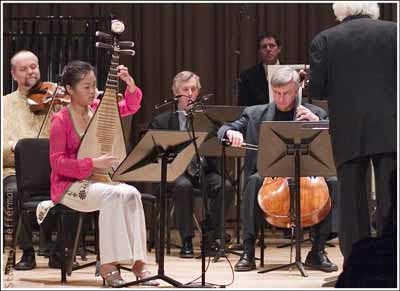| Above his bath, The Emperor of China inscribed the characters MAKE IT NEW.
A great performance of familiar music makes it new. A great performance of unfamiliar music carries it alive into the heart where the music seems somehow familiar, “almost a remembrance”. So it was at the Glenn Gould Theatre last night where Robert Aitken presented six new compositions by Chinese composers, performed by pipa virtuoso wei-Wei Lan and the amazing New Music Concerts Ensemble. The fusion was seamless, delightful and joyous, the perfect emblem of a new year.
|
| “The Simulacrum of a Broken Timbre” (2003) for pipa and percussion quartet by Gouping Jia is made of basic, traditional musical materials redeveloped to form ‘a new musical sonority’. Beautifully conducted by maestro Aitken, the opening sonorities are the whine of finger on water glass rim, ripple of gong, metallic scraping of finger picks on pipa strings, and an eloquence of percussion. These rise, suspend like a held breath, and subside again like the expiration of a mechanical dragon. This piece is just good new music, albeit made in China. |
|
 |
|
| Wei-Wei Lan’s solo performance of “Six War Horses of the Emperor” (2001) by Liu De-hai recalls to these ears a fiery Spanish gypsy flamenco ornamented with ostinato bass lines and continuous fist-rolls, with some moods lighter like Celtic dances and renaissance lute song. The effect on the body is to hold the breathing spellbound in cycles of gentle release.
Shi Fuhong’s karma has brought her to study with Gary Kulesha in Toronto and to the commissioning of “Lightenings” that received its world premiere last night. Based on a poem by Seamus Heaney and structured on the 30th hexagram of the I Ching-“Radiance”, this composition depicts the world’s striving for light and love. It is richly orchestrated for the NMC winds and strings, piano, organ and 4 percussionists ensconced in a pandemonium of drums, bells, chimes, gongs and sonic marvels.
One hears at the beginning Robert Aitken conducting a silence from which emerge some haunted house effects. These rise to a pandemonium that’s soothed by harp and chimes of heaven into a swelling choir of voices that merge into clatter of castanets sounding like gravel cast up onto a naked strand. The four movements include sonorities I would describe as a fever of drums, a touch of ragtime horn, a heart attack machine, a flow of flute and strings thickly textured with gongs and Peter Pavlovsky’s deeply bowed bass, all fading to transparency, evanescence, and space.
Ovation after ovation and intermission.
The most ‘Modern’ and ‘Western’ piece of the evening was Tang Jianping’s composition for pipa and ensemble entitled “Sketch of Plants” (2006), premiered here with the composer in attendance. This well constructed, harmonious work redolent of the propulsive rhythms of Stravinsky and Debussyesque strummings, sighs and ripples, is orchestrated like a concerto around the pipa.
The final composition, “Concertino” (1997) for pipa and ensemble by Guo Wenjing also had a ‘modern’ flavour recalling the urbanity of Poulenc’s early chamber music, especially in the oboe parts. One also hears the later Dadaist connection in the serial rows of pure sonorities that explore pitches, textures and rhythms to the point of crazy onomatopoeic shrieks and cries of excitement or distress. Wei-Wei Lan plays here with great feeling and the piece ends in an explosion of sound that leaves the players as if frozen in time.
Wei-Wei Lan also performed some traditional pieces of exquisite feeling whose beauties were instantly apparent to even these ignorant ears. On the whole, one feels as if a world of music has been newly made and opened for exploration by this Music from Beijing. The prospect, like the concert, is exhilarating.
|


